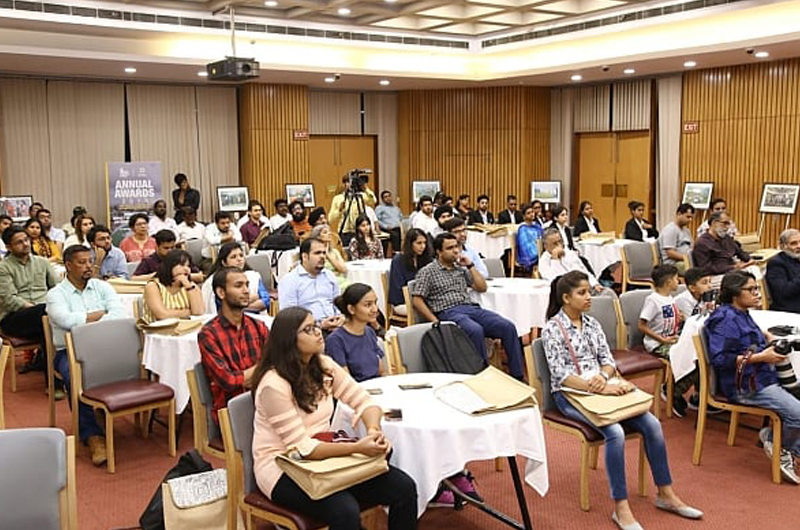Winners of the 13th edition (2019) of the PII-ICRC Annual Awards for Best Article and Best Photograph on a humanitarian subject, jointly organised by the Press Institute of India (PII) and the International Committee of the Red Cross (ICRC) New Delhi Regional Delegation, were announced end-September at the India International Centre in New Delhi. The theme of the annual awards was ‘Impact of Climate Change on Humanitarian Issues’.

Urvashi Sarkar, an independent journalist, won the first prize in the Best Article category for her piece, ‘Our houses are vanishing. Nobody cares’, which appeared on the PARI (People’s Archive of Rural India) website. Disha Shetty, independent journalist, writing for IndiaSpend, bagged the second prize for her article, ‘Bengali-speaking students in Kannada-medium Bengaluru school reveal journey of climate change refugees from disappearing islands’. The third prize-winner in the same category, Anup Sharma, an independent journalist based in Guwahati, was awarded for his article, ‘Living like Nomads’ in The Pioneer – a story that looked at how climate change-induced erosion affected peoples’.

In the Best Photograph category, the first prize was shared by G. Sivaprasad, news photographer, The Mathrubhumi, for his picture, ‘Close to the heart’, and Rijo Joseph, chief photographer, Malayala Manorama, for his picture, ‘Running for life’. The second prize was won by Rinku Raj, senior photographer, Malayala Manorama, for his photo, ‘Rough sea, tough life’. The third prize went to Bibin Xavier, photojournalist, Deepika Daily, for his picture, ‘It was life’.

Special awards were presented in the Best Article category to Jency Samuel, independent journalist from Chennai for her article, ‘Unpredictable seas push fishers away from home’, and to Nikhil Ghanekar, independent journalist based in Delhi, for his piece, ‘When the hills go thirsty’. In the Best Photograph category Prashant K., senior photographer, Lokmat, Pune, won the special mention for his picture, ‘Mining the aquifer’.

The first, second and third place winners received Rs 100,000, Rs 70,000 and Rs 40,000, respectively. Special awardees received Rs 20,000 each. Speaking on the occasion, chief guest, Ramon Magsaysay Award winner Sonam Wangchuk, founder, Himalayan Institute of Alternatives Ladakh, and co-founder SECMOL, said: “We hear about wars among countries, but the impact of the war on nature is much worse. Today, a lot more people are dying in calamities that occur due to the changing environment.” Underscoring the humanitarian consequences of climate change, Yves Heller, deputy head of the ICRC Regional Delegation said climate change worsened vulnerabilities, poverty and inequalities, especially in situations of armed conflict, where countries, communities and populations were the least able to protect themselves and adapt to an ever-changing environment.

Sashi Nair, director-editor, Press Institute of India, Chennai, stressed the need for editors and journalists to play a catalyst’s role in highlighting climate issues on a regular basis and get action taken on avoiding a climate emergency and securing a safe future for the generations to come.





The year saw many interesting entries from national and regional publications covering the wide-ranging impact of environmental degradation and destruction of ecosystems. A discussion on the ‘Impact of climate change on humanitarian issues’ preceded the award ceremony. The panel comprised jury members Dinesh C. Sharma, managing editor, India Science Wire, and senior journalists Rina Mukherji and Sarita Brara. The awards, instituted by the PII and the ICRC, are designed to promote and recognise the outstanding work of journalists in the field of humanitarian reporting.



 from Webdoux
from Webdoux